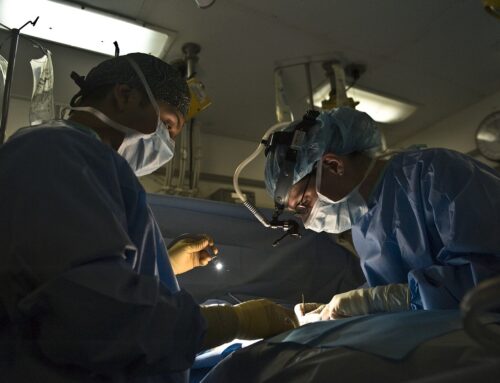Dr Mastakov is a qualified and experienced bariatric surgeon. Like all bariatric surgeons, he provides his patients with all the advice and information they need to ensure they know how to prepare for bariatric surgery. If you are considering metabolic and bariatric surgery, please contact us to book the next available consultation with Dr Mastakov.
1. Speak with your doctor about your decision to have surgery.
You will need to get a referral from your primary care physician or insurance company in order to see a bariatric surgeon. Dr Mastakov accepts referrals from either physicians or insurance companies. Typically, a potential bariatric surgery patient is someone who has tried to adopt healthy lifestyle habits to help them lose weight, but they have still been unable to achieve their weight loss goals. Healthy lifestyle choices, such as following a balanced diet and doing some kind of exercise on a regular basis, are the preferred means to lose weight. However, if such measures have not proven to be successful, then weight loss surgery is worth consideration.
2. Choose a reputable bariatric surgeon.
Once you have a referral, do your research to find a qualified and experienced bariatric surgeon. Dr Mastakov is a reputable bariatric surgeon with extensive experience and expertise. He performs two types of weight loss surgery: Roux-en-Y gastric bypass surgery (RYGB) and Laparoscopic Sleeve Gastrectomy surgery (gastric sleeve surgery). Contact us today to schedule an appointment with Dr Mastakov.
3. Attend a pre-operative appointment with your surgeon.
Prior to surgery you will need to schedule a pre-operative appointment with Dr Mastakov. This appointment will include tests and consultations with various medical professionals in order to determine if you are healthy enough for surgery. Dr Mastakov will also explain how to prepare for bariatric surgery.
4. Quit smoking before surgery.
If you are a smoker, it is vitally important that you stop smoking before your weight loss surgery. Smoking increases the risks of complications during and after surgery, including ulcers and blood clots, so it is important that you quit at least 6 weeks before your surgery date in order to reduce the risk. Adopting a healthier lifestyle is an important component of knowing how to prepare for bariatric surgery.
5. Start making changes to your diet and lifestyle.
You will need to start eating healthier and exercising regularly in order to lose weight and improve your health before surgery. In order to be sufficiently healthy to undergo surgery, you need to adopt healthy lifestyle habits before your procedure. In terms of maintaining long term weight loss after your surgery, a healthy diet and regular exercise need to be established habits beforehand. It is not limited to knowing how to prepare for bariatric surgery – it is knowing how to sustain long-term weight loss.
6. Begin taking vitamins and supplements.
In comparison to other patients, gastric bypass patients are more at risk for developing vitamin and mineral deficiencies. Of particular concern are: iron, calcium, vitamin D and vitamin B12. Therefore, you will need to start taking vitamins and minerals such as iron, calcium, and vitamin B12 before surgery in order to prevent deficiencies.
7. Attend a pre-operative dietitian appointment.
A registered dietitian will help you to create a healthy meal plan that you can follow before and after surgery. It is important to realise that different patients will require different meal plans to prepare them for surgery, and to maintain their post op weight loss. Many patients have pre-conceived ideas about certain diets such as a liquid only diet or one that is high in protein rich foods. A registered dietician will be able to provide you with expert advice and information based on the latest developments in the field.
8. Purchase new clothes for after surgery.
You will need to buy new clothes that fit your post-surgery body once you have lost a significant amount of weight. Many of our patients enjoy being able to shop for clothes in much smaller sizes once they have lost a lot of weight after surgery. So remember to set aside some money to ensure your budget takes into account the new wardrobe for the new you!
9. Arrange for child care or help around the house if needed.
Knowing how to prepare for bariatric surgery means considering the post-op recovery period too. You will need someone to help take care of you and your household duties for the first few weeks after surgery. Most bariatric surgery patients stay in hospital for 2 – 3 days following their surgery. Thereafter, the recovery time at home will be approximately two weeks. Whilst you are recovering from surgery, you will need additional support for daily tasks and commitments. Arrange in advance for family or friends to provide the assistance you will need around the home.
Another recommendation is to find support groups for bariatric surgery patients. If there isn’t a support group that meets locally in your area, there are online support groups that you can join. In our experience, connecting with other people who have undergone weight loss surgery can be an important source of information, advice, and motivation. You can receive lots of helpful tips, advice, and motivation to sustain healthy lifestyle habits and maintain weight loss. However, it is important to remember that bariatric surgery patients need to always refer to their surgeon for medical advice.
10. Pack a bag for your hospital stay.
You will need to bring comfortable clothes, toiletries, books or magazines, and any other items that will help you to stay entertained and comfortable during your hospital stay. Patients are encouraged to wear loose, comfortable clothing following surgery – tight or restrictive clothing is not recommended. Many patients enjoy reading or listening to motivational content as they prepare – mentally and physically – for surgery, and in the immediate recovery period in hospital.
These are just a few of the things that you will need to do in order to prepare for bariatric surgery. Weight loss surgery has the potential to change your life, and we are here to help ensure that you receive the full potential benefits of this procedure. For more information on weight loss surgery and how to prepare for bariatric surgery, please contact our office. We would be happy to help you through this process.







Leave a Comment